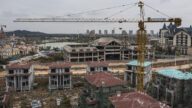【新唐人2011年3月21日訊】在中國大陸發生的“搶鹽潮”, 一直到20號,才慢慢平息下來。緊接著,上海、北京 和南京等城市出現了“退鹽潮”,但商家拒不退貨。分析認為,“搶鹽潮”除了暴露中共政府的公信力危機外,很多深層原因更值得探究。
從3月16號起,中國各地突然爆發市民爭先恐後搶購食鹽的 “盛況”,大量超市的食鹽都銷售一空了。
據報導,廣東過去兩天食鹽銷量,相當於平時一個月。而全中國17號一天的鹽銷量,相當於平時24天的銷量。民眾在搶光食鹽後,甚至連醬油、鹹菜也一搶而空,就連微博上很多人的問候語都變成了“你買鹽了嗎”?南京有名女子對著每包8元搶購來的50包鹽,慾哭無淚,說一家三口要吃4年。
反觀日本人歷經9級地震、特大海嘯和核危機,所表現出來的冷靜和秩序井然,大陸民眾的表現有網友開玩笑說,日本人看到中國搶鹽的鏡頭,本來凝重的臉龐也會失笑,也許會問:“究竟是哪裏發生天災了。”
是中國人瘋了嗎?是中國人愚昧嗎?還是有更深層的原因呢?網路媒體、各界人士對荒唐的“搶鹽潮”的現象也在熱議。
大陸資深媒體人長平認為,光說愚民,有點太表面化了。
長平:“因為大家長期對社會的管理系統缺乏信任,只好自救,而自救又沒有別的辦法,於是就在恐慌中慌不擇路。這就是我們整個的社會體系、救援體系和政府發佈資訊的權威性等一直以來沒有建立,甚至這些年來有所拆毀。所以民眾基本不相信政府、或者以政府為主建立的社會體系。”
英國《金融時報》石述思的文章認為,“搶鹽潮”除了暴露中共政府的公信力危機外,很多深層原因更值得探究。
石述思認為,在中國這個轉型社會,情感缺失,信仰迷失,價值混亂,制度滯後,利益分割,於是大難臨頭,難免人人自危,各自為「戰」。他認為,這是公眾焦慮感和缺乏安全感的一次集體釋放,是整個社會誠信體系崩塌結出的惡之花。
實際上,這並非中國第一次陷入如此恐慌。2003年SARS爆發時,人們大肆搶購板藍根、84消毒液和口罩的情景,至今仍讓人記憶猶新。
《金融時報》另一篇文章《哄搶碘鹽的背後》直接指出,中國的管理層應該要透過“鹽慌”去認清當前的社會問題,採取措施,重構社會的信任,重構公共治理的效率模式,是更為重要的話題。
在搶鹽風潮初起時,中共官方以及所謂的“磚家”們出來闢謠說:『加碘鹽大家不必搶,我國的食鹽供應很充足,大家不必驚慌』。署名李光的文章質問,為甚麼官方剛闢謠完畢,結果超市裡的加碘鹽被搶購一空呢?
李光表示,所謂哀莫大於心死,當普羅大眾面對當局一次次的“食鹽”(食言),已經失去了耐心,那麼到時,政府便成了中國最大最孤立的釘子戶了。難道“大人們”不懼怕強拆的威力嗎?
新唐人記者李靜、李璐綜合報導。
Salt Rush‘s Mistrust in CCP
The‘salt rush’in China has finally calmed down,
and a wave of ‘salt returns’
followed in major cities.
Salt returns are refused by merchants,
and many believe that the ‘salt rush’ reveals
people’s lack of trust in the CCP‘s regime.
Starting March 16, panicked Chinese people
rushed into stores to purchase salt.
The frantic buying has left grocery shelves empty
of salt throughout China.
In Guangdong, a month’s supply of salt was sold out
in 2 days; and on March 17, 24 days supply of salt
was sold out in just 1 day nationwide.
Buyers even raided shelves for soy sauce
and preserved vegetables.
People‘s greeting was “Did you buy salt?”
A woman in Nanjing said that she purchased
50 bags of salt at 8 RMB per bag,
which would last her entire family 4 years.
Looking back, the Japanese faced
the earthquake, tsunami and nuclear crisis
with calm and order, in contrast to the frantic
behavior of the Chinese. Some are joking
that if the Japanese see the ‘salt rush’ in China,
they would ask, “Where did the disaster strike?”
Are the Chinese people absurd? Or ignorant?
Or there are deeper causes behind this behavior?
The ‘salt rush’ fueled discussion throughout China.
Senior journalist, Chang Ping, believes that
it too superficial to blame the people.
“People have to try saving themselves because
they have long lost trust in their society.
They had no other choice but to panic.
The society does not have a notification system
or rescue structure to cope with disasters,
so the people do not trust the government,
nor the society built around this government.”
According to a Financial Times article by Shi Shusi,
the ‘salt rush’ reflects many deeper issues.
“The Chinese society has lost its faith and values;
social policies are outdated,
and the distribution of wealth is a messy disaster.
Everyone worries for himself.
The ‘salt rush’ is a release of public anxiety,
a result of the collapse of social trust.”
In fact, this was not the first panic to hit China.
Similar crisis occurred during the outbreak
of SARS in 2003, when Chinese people rushed
to buy Radix Isatidis, bleach, and masks.
Another Financial Times article pointed out that
Chinese authorities must see the social problems
in China behind the ‘salt rush’, and take actions
to rebuild trust and order in society.
At the beginning of the ‘salt rush’, the CCP had its
“experts” speak to the public that “there is no need
to rush and buy salt. Our country has sufficient salt
supply so there is no need to panic.”
An article by Li Guang asks: “Why were
stores‘ shelves emptied of salt the very next day?”
Li Guang believes that despair is the greatest
sorrow. After countless disappointments,
the people have lost faith in their government.
Aren‘t the officials afraid of this public’s power?
NTD reporters Li Jing and Li Lu.

























